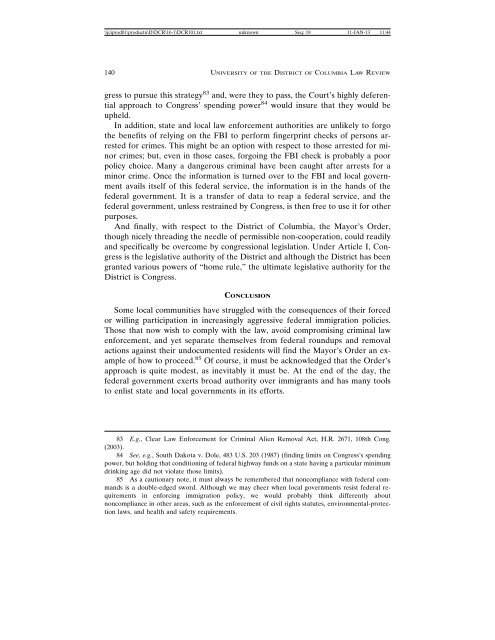threading the needle: constitutional ways for ... - UDC Law Review
threading the needle: constitutional ways for ... - UDC Law Review
threading the needle: constitutional ways for ... - UDC Law Review
You also want an ePaper? Increase the reach of your titles
YUMPU automatically turns print PDFs into web optimized ePapers that Google loves.
\\jciprod01\productn\D\DCR\16-1\DCR101.txt unknown Seq: 18 11-JAN-13 11:44<br />
140 UNIVERSITY OF THE DISTRICT OF COLUMBIA LAW REVIEW<br />
gress to pursue this strategy 83 and, were <strong>the</strong>y to pass, <strong>the</strong> Court’s highly deferential<br />
approach to Congress’ spending power 84 would insure that <strong>the</strong>y would be<br />
upheld.<br />
In addition, state and local law en<strong>for</strong>cement authorities are unlikely to <strong>for</strong>go<br />
<strong>the</strong> benefits of relying on <strong>the</strong> FBI to per<strong>for</strong>m fingerprint checks of persons arrested<br />
<strong>for</strong> crimes. This might be an option with respect to those arrested <strong>for</strong> minor<br />
crimes; but, even in those cases, <strong>for</strong>going <strong>the</strong> FBI check is probably a poor<br />
policy choice. Many a dangerous criminal have been caught after arrests <strong>for</strong> a<br />
minor crime. Once <strong>the</strong> in<strong>for</strong>mation is turned over to <strong>the</strong> FBI and local government<br />
avails itself of this federal service, <strong>the</strong> in<strong>for</strong>mation is in <strong>the</strong> hands of <strong>the</strong><br />
federal government. It is a transfer of data to reap a federal service, and <strong>the</strong><br />
federal government, unless restrained by Congress, is <strong>the</strong>n free to use it <strong>for</strong> o<strong>the</strong>r<br />
purposes.<br />
And finally, with respect to <strong>the</strong> District of Columbia, <strong>the</strong> Mayor’s Order,<br />
though nicely <strong>threading</strong> <strong>the</strong> <strong>needle</strong> of permissible non-cooperation, could readily<br />
and specifically be overcome by congressional legislation. Under Article I, Congress<br />
is <strong>the</strong> legislative authority of <strong>the</strong> District and although <strong>the</strong> District has been<br />
granted various powers of “home rule,” <strong>the</strong> ultimate legislative authority <strong>for</strong> <strong>the</strong><br />
District is Congress.<br />
CONCLUSION<br />
Some local communities have struggled with <strong>the</strong> consequences of <strong>the</strong>ir <strong>for</strong>ced<br />
or willing participation in increasingly aggressive federal immigration policies.<br />
Those that now wish to comply with <strong>the</strong> law, avoid compromising criminal law<br />
en<strong>for</strong>cement, and yet separate <strong>the</strong>mselves from federal roundups and removal<br />
actions against <strong>the</strong>ir undocumented residents will find <strong>the</strong> Mayor’s Order an example<br />
of how to proceed. 85 Of course, it must be acknowledged that <strong>the</strong> Order’s<br />
approach is quite modest, as inevitably it must be. At <strong>the</strong> end of <strong>the</strong> day, <strong>the</strong><br />
federal government exerts broad authority over immigrants and has many tools<br />
to enlist state and local governments in its ef<strong>for</strong>ts.<br />
83 E.g., Clear <strong>Law</strong> En<strong>for</strong>cement <strong>for</strong> Criminal Alien Removal Act, H.R. 2671, 108th Cong.<br />
(2003).<br />
84 See, e.g., South Dakota v. Dole, 483 U.S. 203 (1987) (finding limits on Congress’s spending<br />
power, but holding that conditioning of federal highway funds on a state having a particular minimum<br />
drinking age did not violate those limits).<br />
85 As a cautionary note, it must al<strong>ways</strong> be remembered that noncompliance with federal commands<br />
is a double-edged sword. Although we may cheer when local governments resist federal requirements<br />
in en<strong>for</strong>cing immigration policy, we would probably think differently about<br />
noncompliance in o<strong>the</strong>r areas, such as <strong>the</strong> en<strong>for</strong>cement of civil rights statutes, environmental-protection<br />
laws, and health and safety requirements.














